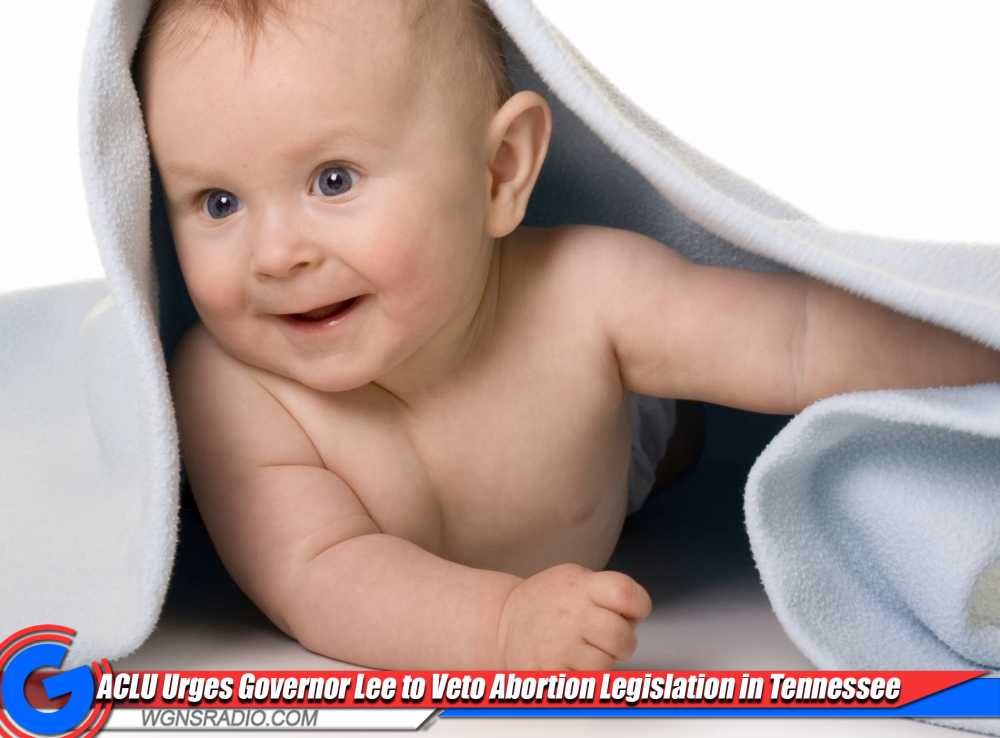On Monday, the ACLU of Tennessee issued a plea to Governor Bill Lee, urging him to veto SB 1971/HB 1895, a proposed bill that would establish a new felony offense for individuals involved in the process of a minor obtaining an abortion without parental or legal guardian consent. The House version of the bill says, “As introduced, creates the criminal offense of abortion trafficking of a minor; provides for a civil action against a person committing the offense of abortion trafficking of a minor for the wrongful death of an unborn child that was aborted.”
Bryan Davidson, Policy Director at the ACLU of Tennessee, emphasized the need to safeguard the rights and well-being of young people in the state. "SB 1971/HB 1895 betrays that duty by isolating and targeting their support network and discouraging their communities and loved ones from helping them for fear of legal consequences," Davidson stated. He underscored the detrimental impact such legislation could have on young individuals seeking support during a vulnerable time.
The ACLU-TN's letter to Governor Lee condemned the bill as "cruel" and "absurd," asserting that it would compel minors to disclose their pregnancy status in potentially unsafe home environments and hinder their access to trusted support networks. Furthermore, the letter emphasized the bill's potential to exacerbate Tennessee's maternal health crisis and infant mortality rate, while failing to address the lack of access to obstetric care facilities in rural areas.
If signed into law, Tennessee would become only the second state in the nation to enact such legislation, signaling a contentious shift in reproductive rights policy. The ACLU's call to action comes amidst growing concern over the potential implications of the bill and its impact on the fundamental rights of young individuals across the state.
Governor Lee's decision regarding SB 1971/HB 1895 carries significant weight, with advocates on both sides of the debate closely monitoring the outcome. As Tennessee stands at a crossroads in reproductive rights legislation, the governor's veto could signal a pivotal moment in the ongoing struggle for reproductive autonomy and individual freedoms.
Source(s): SB 1971, HB 1895, ACLU of TN
SB 1971 SUMMARY - This bill provides that an adult commits the offense of abortion trafficking of a minor if the adult recruits, harbors, or transports a pregnant unemancipated minor within this state for the purpose of (i) concealing an act that would constitute a criminal abortion from the parents or guardian of the pregnant unemancipated minor; (ii) procuring an act that would constitute a criminal abortion for the pregnant unemancipated minor, regardless of where the abortion is to be procured; or (iii) obtaining an abortion-inducing drug for the pregnant unemancipated minor for the purpose of an act that would constitute a criminal abortion, regardless of where the abortion-inducing drug is obtained. However, this bill does not apply to the parents or legal guardian of an unemancipated minor.
This bill classifies the offense of abortion trafficking of a minor as a Class C felony. The bill provides that it is not a defense to a prosecution under this bill that the pregnant minor consented to the actions that led to the offense.
CIVIL CAUSE OF ACTION
This bill provides that a person who commits the offense of abortion trafficking of a minor may be held liable in a civil action for the wrongful death of an unborn child that was aborted. The civil action may be brought on behalf of the unborn child by (i) the biological mother of the unborn child, (ii) the biological father of the unborn child, unless the pregnancy resulted from an act of rape or incest committed by the biological father, or (iii) a parent or legal guardian of the unemancipated minor. In such a civil action, the plaintiff may recover economic damages, noneconomic damages, punitive damages, and reasonable attorney fees and court costs from the person who committed the offense.
ON APRIL 10, 2024, THE SENATE ADOPTED AMENDMENT #1 AND PASSED SENATE BILL 1971, AS AMENDED.
AMENDMENT #1 makes the following changes:
(1) Revises the provision in the bill that classifies the offense of abortion trafficking of a minor as a Class C felony by, instead, classifying such offense as a Class A misdemeanor and must be punished by imprisonment for 11 months and 29 days;
(2) Clarifies that this bill also does not apply to a person who has obtained the written, notarized consent of the unemancipated minor's parent or legal guardian;
(3) Revises the provision in the bill authorizing the civil action to be brought on behalf of the unborn child by the biological father of the unborn child, unless the pregnancy resulted from an act of rape or incest committed by the biological father by adding the following offenses to the exception of bring a civil action mentioned above: (i) aggravated rape; (ii) statutory rape or aggravated statutory rape; (iii) rape of a child; (iv) aggravated rape of a child; (v) statutory rape by an authority figure; (vi) especially aggravated rape; or (vii) especially aggravated rape of a child;
(4) Revises the provision in the bill that provides, as used in the bill, an "unborn child" means an individual living member of the species, homo sapiens, throughout the entire embryonic and fetal stages of the unborn child from fertilization until birth by, instead, providing that an "unborn child" means an individual living member of the species, homo sapiens, at any stage of gestation in utero;
(5) Clarifies that the bill does not apply to the provision of a medical diagnosis or consultation regarding pregnancy care of an unemancipated minor. As used in this amendment, a "medical diagnosis or consultation regarding pregnancy care" does not include performing or attempting to perform an abortion, or arranging for travel for the unemancipated minor to procure an abortion or an abortion-inducing drug without the consent of the unemancipated minor's parent or legal guardian;
(6) Clarifies that the bill does not prohibit a licensed physician or another person from calling an ambulance for a minor patient if a medical emergency exists. As used in this amendment, a "medical emergency" means a condition that, in reasonable medical judgment, so complicates the medical condition of the pregnant woman as to necessitate the immediate abortion of her pregnancy to avert the death of the pregnant woman or for which a delay will create serious risk of substantial and irreversible physical impairment of a major bodily function, not including psychological or emotional conditions. No condition is a medical emergency if based on a claim or diagnosis that the woman will engage in conduct that the woman intends to result in the death or in substantial and irreversible physical impairment of a major bodily function of the woman; and
(7) Clarifies that the bill applies to acts committed on or after July 1, 2024.
ON APRIL 23, 2024, THE HOUSE SUBSTITUTED SENATE BILL 1971 FOR HOUSE BILL 1895, ADOPTED AMENDMENT #3, AND PASSED SENATE BILL 1971, AS AMENDED.
AMENDMENT #3 makes the following changes:
(1) Revises the provision in the bill providing that an adult commits the offense of abortion trafficking of a minor if the adult recruits, harbors, or transports a pregnant unemancipated minor within this state for the purpose of (i) concealing an act that would constitute a criminal abortion from the parents or legal guardian of the pregnant unemancipated minor; (ii) procuring an act that would constitute a criminal abortion for the pregnant unemancipated minor, regardless of where the abortion is to be procured; or (iii) obtaining an abortion-inducing drug for the pregnant unemancipated minor for the purpose of an act that would constitute a criminal abortion, regardless of where the abortion-inducing drug is obtained by, instead, providing that an adult commits the offense of abortion trafficking of a minor if the adult intentionally recruits, harbors, or transports a pregnant unemancipated minor within this state for such purpose;
(2) Provides that the bill does not apply to (i) a common carrier transporting passengers in the course and scope of their business; or (ii) an ambulance driver or operator and any corresponding emergency medical services personnel acting within the course and scope of their duties.





